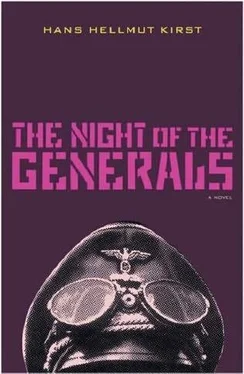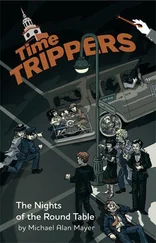“No formalities, please, gentlemen,” he said with heavy bonhomie. “Permit me to bid you a cordial welcome, and thank you for the prompt way in which you accepted my invitation. May our common efforts prove fruitful!”
Commissioner Karpfen raised his glass and the other three followed suit, smiling politely. Liesowski had brought a bottle of smoky Bison Vodka with him from Warsaw. He preferred Polish vodka to Russian.
“Right, let’s get down to business,” said Karpfen.
The three investigators started to remove documents from their briefcases, eyeing one another covertly as they did so. Each realized that the other two were weighing him up, and this led to a certain amount of restrained amusement.
“If we’re looking for common features,” Liesowski said, “the case to concentrate on is the one that’s still warm, so to speak. I think we should start from there.”
“Precisely,” agreed Prévert. He regarded the detective-inspector from Warsaw with the interest which he would have lavished on a century-old brandy. “That’s it in a nutshell.”
At a nod from Karpfen, Liebig obediently spread out his files on the table.
“The only thing I can give you any firm details about,” he began, “is the crime itself. The motive seems clear enough and the victim has been identified, but so far we have no clues as to the murderer’s identity. There have been a number of tips and false leads, but nothing which could be called conclusive.”
“Perhaps we shall be able to offer some suggestions on that point,” said Prévert. “But not, of course, until we’ve heard the results of your investigations.”
Liebig launched into a summary of his findings, and the further he got the more attentive Liesowski and Prévert became. They glanced at each other fleetingly from time to time, their initial reserve giving way to something resembling tacit understanding.
Commissioner Karpfen, who thought he was already in possession of the full facts, brooded absently in his chair. He failed to detect anything in the case which could be called particularly interesting or sensational. In his opinion the crime was the work of a complete lunatic, and such individuals existed in the best-regulated countries.
Detective-Inspector Liebig’s report, reduced to its basic essentials, was as follows: During the night of 12th-13th August 1956, screams were heard issuing from No .7 Sterngasse, Dresden. They came from a flat occupied by a certain Erika Mangier, of no fixed occupation. The local police were notified at once. On reaching the premises, they found the mutilated body of a woman, presumed to be Erika Mangier herself. Homicide was called in and immediately identified the crime as the work of a sexual maniac. Inquiries, which were instituted without delay, had elicited conflicting and, in some cases, implausible statements from a number of witnesses. Erika Mangler’s name appeared in the current list of known prostitutes.
According to the pathologist’s report, Mangier had been stabbed thirty-three times with a sharp, pointed instrument, e. g., a stiletto-type knife, in the region of the throat, breasts and genitals. Most of the wounds were in the latter area. It could be assumed with certainty that death had intervened after the first few blows had been struck.
“Most interesting,” declared Liesowski, when Liebig had finished. He spoke quietly and without apparent emotion. “I worked on a very similar case in Warsaw in 1942. Place, victim and method were much the same, and the pathologist’s findings were almost identical.”
“The same goes for me,” said Prévert. “Rue de Londres, Paris 1944.”
“Really?” Karpfen was slowly emerging from his lethargy. “But how can that be? I ask you—the same type of crime in three entirely different places?”
“There’s quite a simple explanation,” Prévert said. “The murderer is a man who has moved around a lot. The last war was an indirect cause of mass migration, and historic events of that sort often have strange side-effects. In our particular case, all we’ve got to do is find someone who was in all three places at the times in question.”
The Commissioner smiled indulgently. “How do you propose to do that? Europe was upside down in 1942 and 1944.”
Liesowski said: “In the course of my inquiries I came across a peculiar point—so peculiar that the German authorities took the case out of my hands at once.”
“The officer in charge was called Grau, wasn’t he?”
Liesowski stared at Prévert in amazement. “You’re right! The salient feature of my inquiries, as far as they went, was that a witness stated that he’d seen a man in Wehrmacht uniform.”
“A soldier near the scene of the crime?” Liebig pricked up his ears. He hurriedly thumbed through his papers until he found what he wanted. “I have a similar statement here. Someone saw a soldier sitting in a parked car just round the corner. He was there for some time. My men interviewed him, but they didn’t find anything suspicious. He was an N. C. O. named Wyzolla, an army driver. But he was a young man. That rules him out—he must have been a child at the time of the Warsaw and Paris murders.”
“I think we’ve reached the end of the road,” said Prévert. He looked across at Liesowski. “Do you agree?”
The policeman from Warsaw nodded. “This is the decisive factor, there’s no doubt about it.”
“Wait!” cried Karpfen. He was wide awake now, and puffing like a grampus. “Take it easy, gentlemen, please! I feel we’re skating on thin ice.”
“Why?” inquired Prévert. “We’re after a murderer. What’s so ticklish about that? Besides, I already know the murderer’s name, and have done for twelve years. These parallel cases were all I needed to complete my chain of evidence. Now, I’m absolutely sure of my ground.”
“I thought I knew who the murderer was, too,” said Liesowski. “I managed to find a witness who was prepared to make a detailed statement. Major Grau, the German officer we mentioned earlier, appeared to share my suspicions, but he never succeeded in clearing the case up. It was hardly surprising, considering the unusual nature of the evidence before us. For a long time even I felt disinclined to believe it.”
“I was in exactly the same position.” Prévert nodded understandingly at his Polish colleague. “I also felt chary of accepting it.”
“Please be more specific!” Liebig demanded impatiently. He was all detective now, nothing else. He seemed to be blind to his superior’s warning glances and deaf to his snorts of protest. “Theories are no good to me on their own. I need positive proof.”
Prévert made a gesture of invitation to Liesowski. He might have been lowering a poised dagger in deference to someone who had a better claim to strike the first blow.
Liesowski said: “The man in question is a general named Tanz.”
Commissioner Karpfen leapt to his feet, purple in the face. He appeared to be on the verge of apoplexy.
“I declare this meeting adjourned,” he said peremptorily, “and I regard the last remark as stricken from the record. Please act accordingly, Herr Liebig. I request you to close your files and release no more information until further instructed. I regret having to make this decision, but I have no other choice.”
“Why?” asked Prévert. “Do you want to obstruct the course of justice? I can’t think of any other way of describing your attitude.”
Karpfen subsided into his chair. He sat back with legs splayed, fished out a handkerchief and began to mop his brow.
“Gentlemen,” he said wearily, “you are police officers and experienced members of your profession, but I am first and foremost a civil servant. As such, I have special responsibilities. Apart from that, I serve a country which is having difficulty in gaining the recognition it deserves—for reasons which we need not go into here. But you, Herr Prévert, and you, Herr Liesowski, belong to nations which can never be expected to entertain any particular sympathy for us.”
Читать дальше












